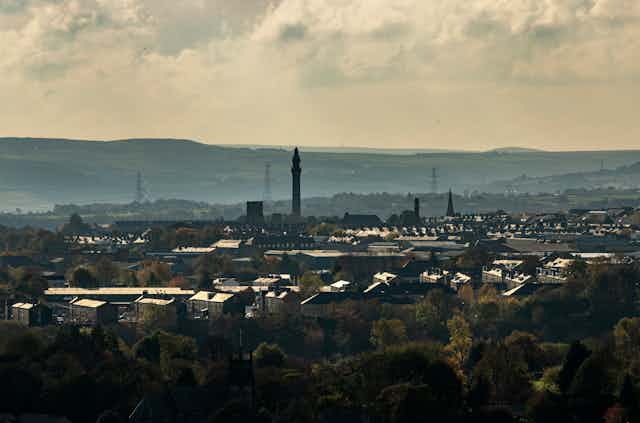The upcoming UK election is likely to be the most volatile and unpredictable in modern times. In order to win a majority, the Conservative Party will be targeting Leave-voting seats in the North of England – many of which have long been Labour strongholds.
The Conservatives are seeking to win over the so-called “Workington Man”. This, apparently, is an older, white, Brexit-voting man from a former industrial town (such as Workington in Cumbria) who has traditionally voted Labour but could perhaps be tempted to consider the Conservatives now.
But will this strategy succeed? The extent to which Brexit identities trump traditional party-political allegiance in determining voter choice will be a key factor.
The North voted 56% to 44% in favour of Leave. However, it broadly represented the national picture of more deprived towns opting for Leave and cities and more affluent places backing Remain. The characterisation of the North as overwhelmingly Leave supporting is therefore inaccurate.
Nevertheless, there are many places across the North where support for Leave was high and this could help the Conservatives. Brexit identities – being a “Leaver” and “Remainer” – have become increasingly significant political labels for much of the electorate. They are now more important than party allegiance in some cases. If this proves to be the case in this election it may well be that Boris Johnson’s position as an ardent Leaver wins him votes in Leave-supporting towns in the North.
But the failure to secure an exit from the EU on the October 31 deadline may go against the party, particularly if the Conservatives are faced with an attack from the Brexit Party on this front. While it is unlikely that the Brexit Party will win any seats in the North themselves, they may split the Leave vote enough to ensure that the Conservative do not actually benefit significantly from any Leave-Remain voting divides. At present, it seems unlikely there will be a formal alliance between the two parties to prevent this from happening.
Labour may also lose votes in the North because of their position on Brexit but this will probably be less damaging than a Conservative-Brexit Party voter split will be for Johnson’s party.
Towns and cities
The Leave-Remain divide is not the only issue that the 2016 referendum brought to the fore. The divide between Leave and Remain and towns and cities connects with what has been termed a cosmopolitan-communitarian divide. This encompasses political divides along education, social class and age lines. These divides have long existed but increased in prominence at the EU vote and were also notable at the 2017 election.
In terms of the impact of this on party support, it now appears that the young, the more highly educated, professionals and more liberal-minded voters are increasingly likely to vote Labour. Meanwhile, older, less well educated, semi-skilled workers and those with a more socially conservative outlook are increasingly likely to back the Conservatives.
This goes beyond Brexit. Socially conservative voters – many of whom self-identify as working-class and tend to hold fewer formal qualifications – who are concerned about cultural identity, national security, and value a “sense of belonging” have been deserting Labour since at least the 2015 election.
Then it was largely to UKIP – but this time around it is likely that these voters will find greater appeal in the Conservative’s pledges to both increase public spending and “take back control” rather than Labour’s more radical policy proposals. For many such voters, Labour and Jeremy Corbyn in particular are perceived to pose a threat to the values they hold dearest.

This is significant because, when viewed as a whole, the North is disadvantaged in socioeconomic terms relative to much of the rest of England. In many constituencies across the North, working-class, socially conservative voters like those described above are a key demographic. As such, it is likely that the Conservatives will benefit there from this changing nature of party support in the forthcoming election. But the extent to which they will do so remains unclear as there is evidence that the Conservatives still fail to connect with the most disadvantaged voters.
Since becoming prime minister, Johnson has attempted to appeal to poorer areas of the North, pledging to reboot the Northern Powerhouse agenda and promising greater investment in the region as well as in public services nationally.
With Labour also campaigning strongly on tackling regional inequality this could become a key debate. The question of whether the Conservatives remain too “toxic” a brand for many Northerners may prove pivotal here.
It seems likely that the Conservatives will have their best performance in decades in the North of England at the 2019 election, at least in terms of the number of votes gained. They will pick up additional support across the region because of their position on Brexit and from socially conservative voters in traditional Labour areas turning their back on the party in line with the cosmopolitan-communitarian divide.
But it is likely that this will still prove to be insufficient in terms of winning a significant number of seats in the North because of potential splits in the Leave vote, the historic distrust of the Conservatives that persists across much of the North, and the sheer scale of Labour majorities in the types of seats the Conservatives will be seeking to win.
If the party is pinning its hopes of winning a majority on a breakthrough in the North then it may struggle to remain in government following the election – particularly if it loses seats to the SNP in Scotland and the Liberal Democrats in the South of England.


